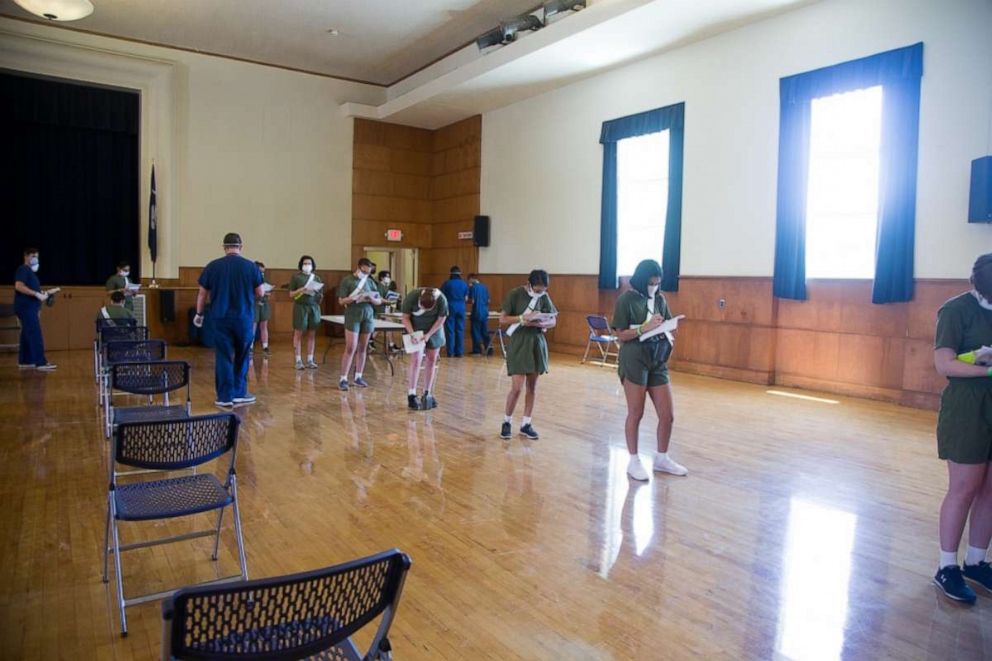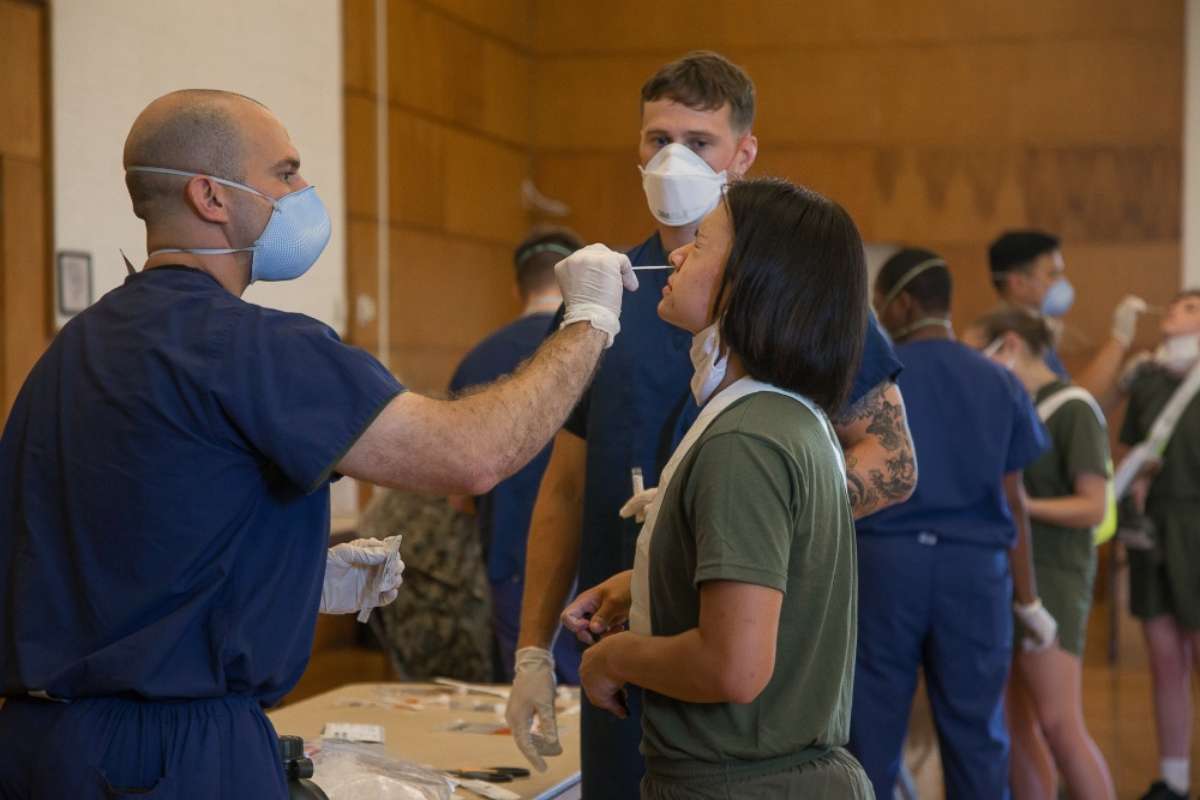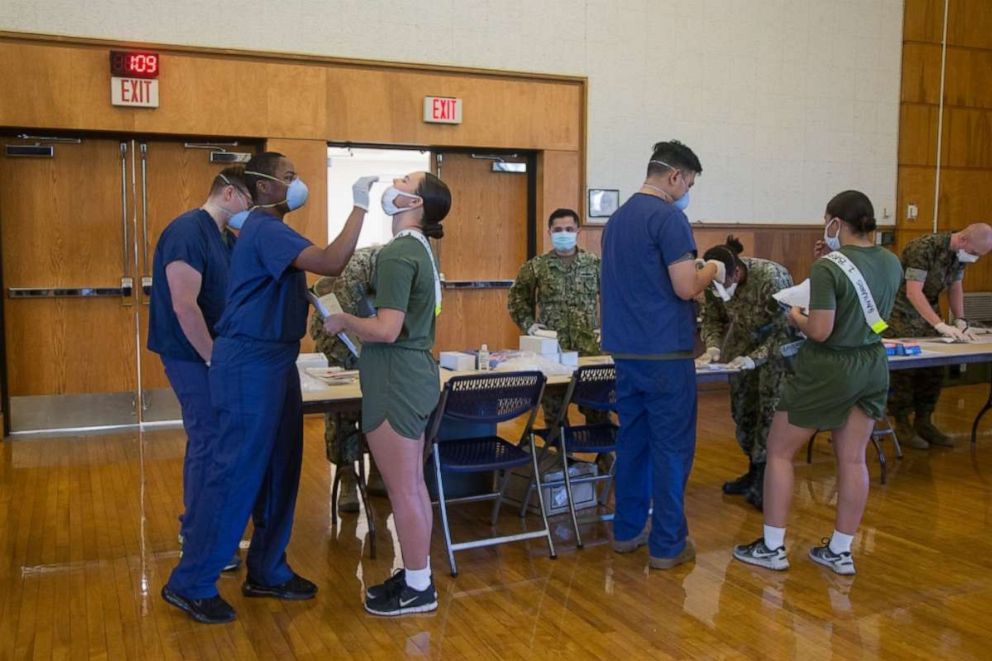Study of young Marines in basic training could provide coronavirus clues
Little is known about why young adults tend to have mild symptoms of the disease
A Navy research study of 3,500 Marine recruits could help provide answers as to why young adults infected with COVID-19 seem to get mostly mild cases of the disease or may not present any symptoms at all.
The two-month study of healthy 18- and 19-year-old recruits could give new insights into a group that has been little studied during the novel coronavirus pandemic.
"There really isn't another cohort out there that is looking at young healthy Americans that have been brought around from all over the United States," said Cmdr. Andrew Letizia, a Navy doctor and researcher at the Naval Medical Research Center, who is leading the study.
Since most of the Marine recruits volunteering for the study are 18 and 19 years old and of different genders, races and ethnic groups, Letizia believes the study's findings could provide data for the reopening of colleges, "due to the overlap of of the demographics between our cohort and those of otherwise young, healthy Americans that are traveling and returning back to school."

"We know that COVID-19 seems to not be as severe in these young healthy Americans, and the question is why," said Letizia. "What is it about their immune system that is slightly different and allows them to have -- if they do get infected -- maybe no symptoms at all, or maybe fewer slight symptoms that they're able to quickly overcome."
Letizia hopes the study's initial findings, expected in late August, could provide answers to those questions and help develop better therapeutic treatments and vaccines.
The COVID-19 Health Action Response for Marines study -- known by the acronym CHARM -- began in early May and will track up to 3,500 Marine recruits from the moment they arrive at the location where they will quarantine for 14 days before they head to basic training at Marine Corps Recruit Depot Parris Island in South Carolina.
After a rash of coronavirus cases at Parris Island earlier this year, the Marine Corps temporarily paused the flow of recruits to the base and established a quarantine area at The Citadel in South Carolina. That quarantine area is now located in the Atlanta area.
Recruits who volunteer for the study are monitored for the two weeks they are in quarantine and another six weeks at Parris Island.

Upon arrival each volunteer gets a nasal, saliva and blood test to determine if they have the novel coronavirus, followed by a similar round of tests the following week and four more tests every two weeks.
"We want to follow them to determine if they become infected," said Letizia. "And if they do become infected, how their body is able to mount an immune response and ultimately fight off the infection."
The Navy researcher said running the tests is "like combing through the sand in order to find those individuals that subsequently become infected."
As of last week slightly more than 2,000 Marines had been tested as part of the study, with the goal of ultimately testing 3,500.
Researchers hope to find enough COVID-19-positive recruits to form a statistically significant sample that will spot trends in the research.
The regular blood tests measure the various components of the human immune system including the cells that make antibodies, the cytokine markers that detect a virus in the body and the T-cells that help coordinate the immunological response to the disease.

In explaining the study to Marines, Letizia characterizes the antibodies as "the bombs and the missiles and the tanks" to fight the disease, but it is equally important to see how they are produced in "a factory" and why.
"Well, the factory needs to receive an order from somewhere, telling it 'Hey, you need to make more of these things,'" said Letizia.
Researchers expect the testing to detect enough coronavirus-positive recruits that will form a statistically significant sample and Marines who test positive will go through more rounds of testing than the broader test group.
For the Marines and the Navy, the study could provide more information about about additional health protective measures to maintain operational readiness as the pandemic continues.
Letizia has been impressed by the experience and skill of his team of 20 Navy hospital corpsmen and civilian contractors in carrying out the tests and quick freezing the samples before packaging them off quickly for study in labs.
He is equally impressed by the young Marines who have volunteered for the lengthy study during their stressful boot camp experience.
"We're forever indebted to them," said Letizia. "These are individuals who were asked to give blood and saliva and having an up-the-nose swab six times over an eight-week period, despite the physically demanding, mentally exhausting and sleep-deprived conditions that is basic training."
"Yet, that they're still willing to do this with us really speaks to the millennial generation -- doing their part when it comes to COVID-19," he said.
What to know about the coronavirus:
- How it started and how to protect yourself: Coronavirus explained
- What to do if you have symptoms: Coronavirus symptoms
- Tracking the spread in the U.S. and worldwide: Coronavirus map
Tune into ABC at 1 p.m. ET and ABC News Live at 4 p.m. ET every weekday for special coverage of the novel coronavirus with the full ABC News team, including the latest news, context and analysis.




